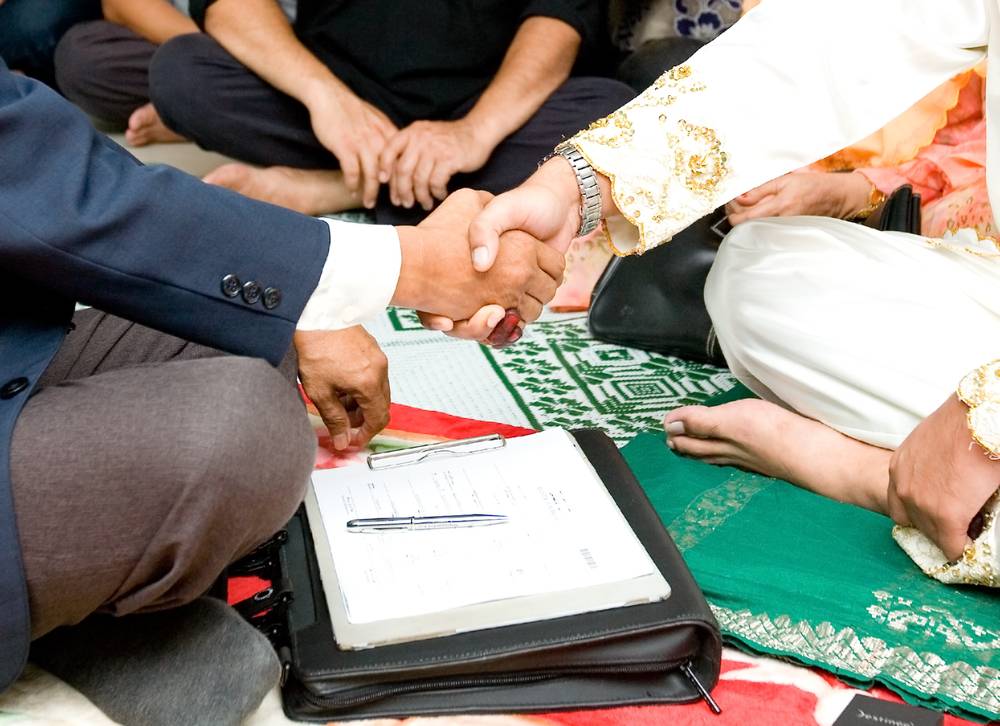 Last updated: December 17th, 2019 5:09 PM
Last updated: December 17th, 2019 5:09 PM
Muslim Marriage Act
The Muslim Marriage Act was drafted into the Indian legal system in the year 1954. The Act regulates the solemnization of marriages among the Muslim community in India. According to this Act, both the groom and the bride are to consent to the marriage of their free wills. A formal, binding contract verbal or on paper is considered integral to a religiously valid Muslim marriage and outlines the rights and responsibilities of the bride and groom. This Act applies to all Indian citizens, whether residing in India or abroad. The State of Jammu and Kashmir is excluded under the ambit of this Muslim Marriage Act, though residents domiciled in other states but residing in Jammu and Kashmir would qualify for these provisions. In this article, we will look at the Muslim Marriage Act, 1954 in detail.Requisites of Marriage
Requisites of a valid Marriage under the Muslim Marriage Act are explained in detail below:- Both the parties (groom & bride) should belong to and professes the Muslim faith or religion
- Each of the parties should as regards age, mental capacity and otherwise, be capable of contracting marriage
- The bride and groom will not by reason of anything contained in the Islamic law relating to marriage be prohibited from marrying one another
- As per this act, the Muslim bride and groom, understanding the nature of the contract, will freely consent to marry one another
- Muslim marriage will be affected by or before a person appointed as a marriage officer under the provisions of the Muslim Marriage Act
- Marriage will be registered in accordance with the provisions of the Muslim Marriage Act
Non-Applicability of Act
The Muslim Marriage Act is not applicable to following the type of marriages. In any case, the marriages contracted and registered under this act, the same will be null and void ab initio.- This act is not applicable if either of the parties has or had a wife or husband alive at the time of contracting and registering the marriage
- Muslim Marriage Act is not applicable if either party is directly descended from the other
- If the bride is a sister of the male either by the full or the half-blood, marriage won’t be solemnised under the Muslim Marriage Act
- If the groom is a sister of the female either by the full or the half-blood, marriage won’t be solemnised under the Muslim Marriage Act
Age Limit and Consent
The age of a person, being a member of the Muslim community, is capable of contracting marriage will be sixteen years. If whom being a male is less than twenty-one years of age or being a female is under eighteen years of age (not being a widower or widow), the consent to such marriage will be registered with the presence of following persons:- Father if living
- If the father is dead, the guardians lawfully appointed or of one of them
- If there is no guardian, then of the mother
- If there is no mother living, then of such other persons as may be appointed by the Minister
Muslim Marriage Certificate
Immediately after a Muslim marriage has been affected by or before a marriage officer, he/she will enter in a book to be supplied by the Registrar-General and kept by the marriage officer. For that purpose, a Muslim Marriage Certificate in the prescribed format of the marriage will be signed by the marriage officer and by the parties to the marriage and by two credible witnesses, and such marriage officer will enter up in the counterfoil the prescribed particulars and sign the same. Every marriage officer within seven days of a Muslim marriage being affected by or before him, transmit to the Registrar-General the Muslim Marriage Certificate. Upon receipt of this Certificate the Registrar General, if it appears to him that the requisites of a valid Muslim marriage have been complied with and that the consent of any person required by this Act to consent to such marriage has been obtained, will cause the same to be registered. Every marriage officer without reasonable cause or excuse fails to transmit to the Registrar-General any certificate in accordance with the provisions of this act will be guilty of an offence against this Act and will be liable on summary conviction before a Resident Magistrate to a fine not exceeding twenty dollars.Correction of Clerical Errors in Register Book
The Registrar-General will correct any clerical error in any Muslim marriage certificate filed in his office and the Register Book and will authenticate every such correction by his signature and the date of such correction.Searches in Register Book
Upon payment of the prescribed fee, the Registrar-General will at all reasonable times allow searches to be done in the Register Book and swill gives certified copies. Any certified copy under the hand of the Registrar-General will be a correct copy of any entry in the Register Book will be admissible as evidence of the registration of the marriage.The language of Record Book
All prescribed applications, certificates and entries in the Register Book will be in the English language.Application of Legitimating Act
The Legitimating act will apply, muiatis mutandis, to persons legitimated by reason of registration under the provisions of this Muslim Marriage Act.Popular Post

In the digital age, the convenience of accessing important documents online has become a necessity...

The Atalji Janasnehi Kendra Project that has been launched by the Government of Karnataka...

The Indian Divorce Act governs divorce among the Christian couples in India. Divorce...

When an individual has more than a single PAN card, it may lead to that person being heavily penalised, or worse,...

Employees Provident Fund (PF) is social security and savings scheme for employee in India. Employers engaged...


